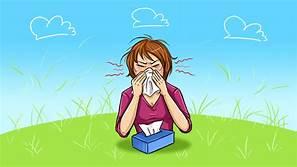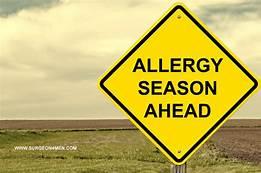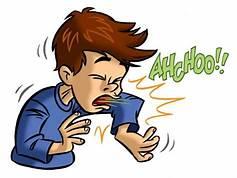Results: Ah Choo! It's Nothing To Sneeze At
Published on 05/03/2019
QUESTIONS
GO to COMMENTS
Comments
1.
1.
For seasonal allergy sufferers, spring can be challenging -- as 25% to 30% of Canadians and Americans suffer from seasonal allergies. Sometimes called "hay fever" or seasonal allergic rhinitis, these are allergy symptoms that happen during certain times of the year, usually when outdoor molds release their spores, and trees, grasses, and weeds release tiny pollen particles into the air to fertilize other plants.. Environmental allergies are different from seasonal allergies in that they're found year-round versus different times of the year. Environmental allergies include exposure to dust mites, cockroaches and pet danger. Do you suffer from seasonal allergies or environmental allergies?

Seasonal allergies only
25%
557 votes
Environmental allergies
8%
170 votes
Both seasonal and environmental allergies
29%
644 votes
Not Applicable
39%
879 votes
2.
2.
Which allergy facts are you familiar with?

Hay fever, or allergic rhinitis (AR) was named because symptoms would strike during hay harvesting season when these pollens would be in the air. It has nothing to do with hay specifically – allergic rhinitis means swelling, and inflammation of the nose.
33%
742 votes
You can grow out of your allergies. Most allergies start in childhood, and can change over time, and some sufferers outgrow them.
33%
742 votes
Mould is present indoors, in any area of dampness, including basements, bathrooms, in the cabinet under sinks, as well outdoors on dead leaves or uncut grass. Outdoor moulds are often forgotten about as causes of allergies and can be a major trigger for asthma. However, large exposures to indoor moulds can also be detrimental
34%
755 votes
In general, levels of pollens correlate with symptom severity, so it may be helpful to monitor pollen counts so you can limit your exposure on days where counts are high. It may also help you adjust medication to control symptoms. The counts are reported for specific plants such as trees, grasses, weeds, and mould spores
26%
588 votes
Unfortunately, there is no cure for allergies or asthma. There are however very effective treatments that allow people to live active lives, including antihistamine pills, nasal steroid sprays, and eye drops. Exposure to pollens, or house dust mites, in the form of shots or tablets, can desensitize the immune system to tolerate these allergens and eliminate symptoms
29%
643 votes
Nasal steroids take longer to work but are not addictive. When pollen counts get high, an antihistamine pill may just not be enough to tackle symptoms so allergy sufferers need to reach for other relief like nasal sprays, eye drops, and some may choose to explore immunotherapy.
16%
361 votes
Familiar with all
17%
373 votes
Not familiar with any of these
28%
639 votes
Seasonal allergies are less common during the winter, but it's possible to experience allergic rhinitis year-round. Different plants emit their respective pollens at different times of year. Depending on your allergy triggers and where you live, you may experience hay fever in more than one season
35%
784 votes
3.
3.
While the symptoms of seasonal allergies resemble a cold, with watery or itchy eyes, runny or stuffy nose, and congestion, perhaps the most bothersome symptom is that constant sneezing (no, I don't have a cold, it's just allergies). How many of these (Ah Choo!) facts about sneezing did you know?

The reason that we sneeze is because our bodies are reacting to irritants—including dust, pollen, and animal dander—in the nose lining. When these irritants get into our noses, our brain receives a signal to get rid of them and we sneeze. You take a deep breath and hold it, causing the muscles in the chest to tighten. That pressure forces your tongue against the top of your mouth and the air to travel quickly out of your nose when you release your breath. Sneezing is nothing more than a reflex to irritants (still bothersome though!)
39%
883 votes
It is a myth that your heart stops when you sneeze. But the rhythm of your heart can change when you sneeze. This happens because the pressure in your chest changes and alters your blood flow.
18%
414 votes
A sneeze can travel up to 100 miles an hour. Because the air is moving out of your nose so quickly you typically make a noise. The faster the air moves, the louder the sneeze.
19%
431 votes
Sneezing is a workout. One sneeze engages your throat, chest, diaphragm, and abdomen.
16%
365 votes
When your brain receives the signal to sneeze it also signals your eyes to close. You can't keep them open, it's an involuntary action.
24%
535 votes
Not many cases have been reported, but attempting to hold in a sneeze can cause broken blood vessels in the eyes, damaged blood vessels in the brain, and/or ruptured eardrums. You should never hold in a sneeze.
15%
345 votes
While you're sleeping, the nerves that cause you to sneeze are also resting, so you can not sneeze in your sleep.
9%
199 votes
Since the act of sneezing is your body's way of clearing out irritants from your nose, it might take a few tries to get them all out. That is why you often sleep multiple times in a row.
21%
466 votes
Knew all of them
14%
304 votes
None
34%
757 votes
4.
4.
The Asthma & Allergy Foundation of America lists these states as the best states for those with allergies to live in: Massachusetts, California, Utah, South Carolina, Washington, Connecticut, Idaho, Colorado, Oregon and Florida. The states that are the worst for allergy sufferers are Ohio, Kentucky, North Carolina and Tennessee. Would you ever consider moving to another state (or province) to possibly lessen or avoid allergies?

Yes
24%
531 votes
No
76%
1719 votes
COMMENTS


